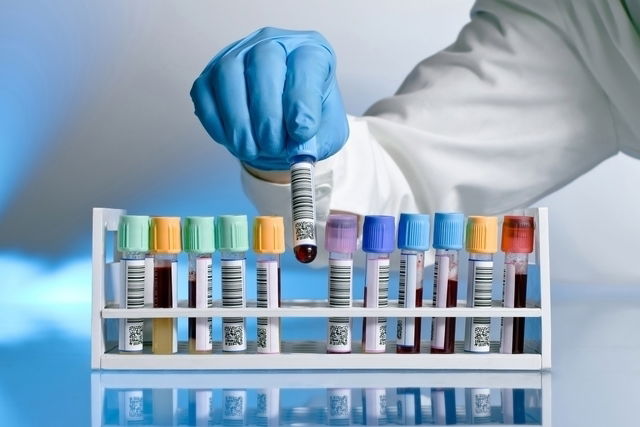A T3 (triiodothyronine) test is ordered by the doctor, usually alongside a TSH or T4 test, when a patient presents with signs and symptoms of a thyroid problem.
The TSH hormone is mainly responsible for stimulating the production of T4 (thyroxine) hormone, which is metabolized in the liver and is transformed into its most active form, T3 (triiodothyronine). Although most T3 is derived from T4, the thyroid also produces it, although in smaller quantities.
The T3 test does not require fasting, however, some medications (like thyroid hormones and birth control) can interfere with the test results. Therefore, it is important to inform your doctor of any medications you are taking to determine whether you should suspend any use prior to testing.

Why it's ordered
The T3 test is requested when the TSH and T4 test results are altered or when the person presents symptoms of hyperthyroidism. This hormone is typically found in low low concentrations in the blood, which is why a T3 level alone is not widely used to assess thyroid function. It is normally requested when a thyroid condition has already been confirmed, or if a TSH and T4 test is also being ordered.
Also recommended: Thyroid Tests: 9 Tests That Assess Thyroid Functioning tuasaude.com/en/thyroid-testsIn addition to being useful in helping to diagnose hyperthyroidism, the T3 test can also be order to help identify the underyling cause of hyperthyroidism, such as Graves' disease. It can be requested together with thyroid antibody tests.
How it's done
The T3 test is done by completing a blood sample, which is analyzed in the laboratory. This evaluation can determine the total T3 noted in blood, as well as the free T3 levels. Free T3 looks at the amount of T3 that is free-floating in the blood, while total T3 looks at both the free-floating T3 and the T3 bound to a protein.
It is not necessary to fast prior to this test, however it is important to disclose whether you are taking any medication, as some medications can interfere with results.
Normal levels
Normal total T3 is typically between 80 and 180 ng/dL, while free T3 is between 2.5 - 4.0 ng/dL. However, reference values may vary from lab to lab.
What results mean
Certain conditions can ause T3 levels to be high or low:
- High T3: Normally confirms the diagnosis of hyperthyroidism, and is usually a of Graves' disease
- Low T3: May be a sign of Hashimoto's disease, neonatal hypothyroidism or secondary hypothyroidism. Additional tests are required confirm a diagnosis.
The results of the T3 test, as well as the T4 and TSH, only indicate that there is some change in the production of hormones by the thyroid, but they do not confirm what is causing dysfunction. Therefore the doctor may order more specific tests to identify the cause of hypothyroidism or hyperthyroidism, such as a complete blood counts, immune testing and imaging tests.
What is reverse T3?
Reverse T3 is the inactive form of T3, which has been conversed from T4. The measurement of reverse T3 is rarely ordered, and is usually only indicated for patients with serious thyroid diseases that cause low T3 and T4 levels. Reverse T3 can be elevated in situations of chronic stress, HIV infection and renal failure.
Normal reverse T3 levels in newborns are 600 and 2500 ng/mL and from the 7th day of life, they are between 90 and 350 ng/mL. However, these reference values may reference from lab to lab.






























